After tooth extraction, many people wonder when is the best time to get dentures. In fact, if the gums are stable and able to support, you can choose a porcelain bridge or removable denture after about 1-2 months. In the case of dental implants, the appropriate time is usually 2-3 months after tooth extraction, when the jawbone and gums have completely healed. Dental studies show that 10–12 weeks after extraction is the optimal period for recovery, ensuring long-term results and limiting complications. Choosing the right time for tooth implantation will help restore chewing function and aesthetics in a comprehensive way.
Is it okay if a tooth is extracted and not replanted?
Tooth loss due to accidents, old age, tooth decay or dental diseases that require tooth extraction is a common situation. However, is it okay to have a tooth extracted and not replanted? The answer is YES, because when a tooth is lost and not restored in time, there will be many serious consequences for oral and overall health.
At the location where the tooth was removed, the jaw bone will be empty, gradually leading to jaw bone loss due to no chewing force. This not only makes it difficult to chew, affecting the digestion of food, but also increases the risk of gastrointestinal diseases.
Loss of teeth also deforms the face, especially when the chewing force is misaligned, easily forming wrinkles and causing the face to age faster. In addition, the remaining teeth will move into the empty space, causing misaligned teeth, changing the bite, and even leading to pain in the temporomandibular joint.
In particular, losing front teeth can cause you to pronounce incorrectly, easily lisping or slurring your words. The gap when smiling also greatly affects aesthetics (oral teeth), causes self-esteem and limits social interaction.
As a doctor with experience in the field of denture implantation, My Auris advises you to restore your teeth soon after extraction, to preserve the jaw bone, restore chewing force, protect oral health and ensure aesthetic factors. Choose reputable dental facilities with a team of highly skilled dentists to perform dental implants safely and effectively.
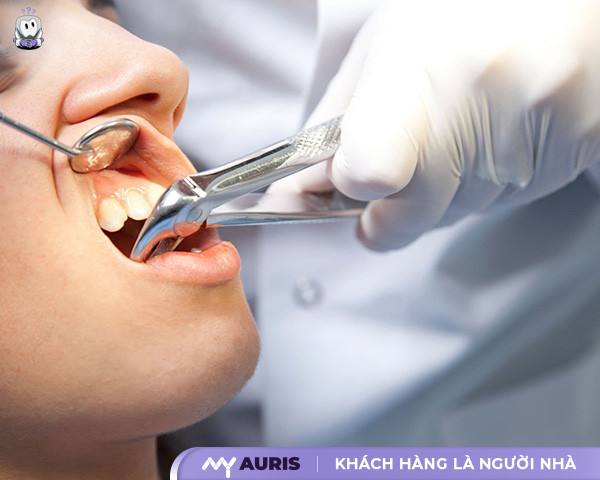
How long after tooth extraction can I get dentures?
How long it takes for a tooth to be replanted depends on many factors, the most important of which is the healing state and the level of tooth infection before the extraction. Normally, after about 7 days, the tooth socket begins to have fleshy buds. About 1-2 months later, the soft tissue at the tooth extraction site has recovered relatively, but on the jaw X-ray, the old tooth socket boundary can still be seen. It takes from 3 to 2 months. After 6 months, the jaw bone can be completely regenerated to be eligible for a fixed denture.
Normally, after 1-2 months of tooth extraction, the patient can be restored with flexible solutions such as porcelain bridges or removable dentures. For the implant technique, the waiting time is at least 2-3 months. However, in some special cases In particular, implants can be placed immediately or temporary restorations can be performed immediately after extraction, if the patient’s condition is good and there is no infection.
In elderly people or large tooth extraction wounds, the healing time will be longer. justify;”>For the dental implant process to achieve optimal results, in addition to choosing the right dental implant technique and appropriate dental implant method, the patient needs to strictly follow the post-extraction care instructions, abstain appropriately, and take medication as prescribed.
Current popular denture implantation methods
When permanent teeth are lost, tooth restoration is essential to ensure chewing ability, aesthetics and maintain facial structure. Currently, there are 3 methods Denture implant methods are widely used, each method has its own advantages and disadvantages.
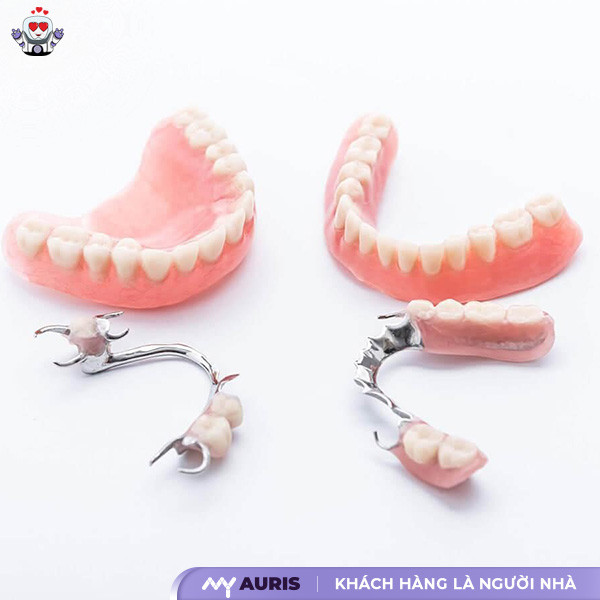
Removable denture
Advantages:
- Fast restoration time, low cost suitable for many people.
- Can be conveniently removed for daily oral hygiene.
Disadvantages:
- Short lifespan, usually only used for 3–5 years year.
- Limited when eating hard or chewy foods because it easily drops the jaw.
- Cannot prevent jaw bone loss, long term causes changes in facial structure, leading to premature facial aging.
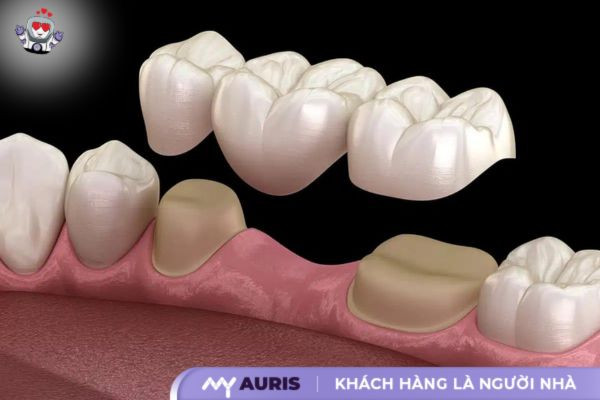
Ceramic dental bridge
Advantages:
- Restores chewing function better than removable dentures.
- The teeth are firmly fixed, bringing a natural aesthetic appearance.
Disadvantages:
- Need strong teeth grinding on both sides to make pillars, affecting the teeth real.
- If technique is not correct, it can easily cause damage to both real teeth and dentures.
- Use time is 7–10 years and cannot prevent decay. jawbone, causing the face to age easily.
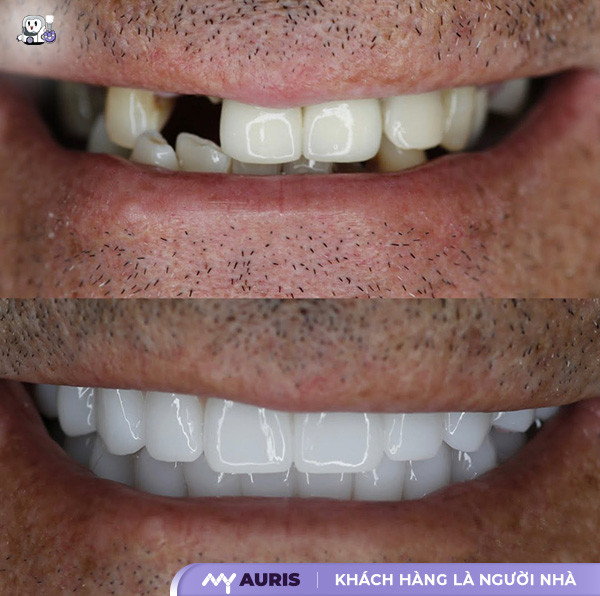
Dental Implant
Dental Implant is considered the most modern and optimal denture solution today, especially suitable for those who have lost teeth for a long time.
Advantages:
- Almost perfect restoration of both chewing function and aesthetics, reaching 99% compared to real teeth.
- Only needs to be done once, but the lifespan can last a lifetime, helping to save costs in the long run long.
- Is the only method capable of preventing jaw bone loss, protecting facial structure and limiting facial aging.
Disadvantages:
- Up to now, Implants have almost no significant disadvantages if done with proper techniques and good care.
Frequently Asked Questions
How long does it take for a front tooth to be replanted?
After the front tooth is extracted, if the jawbone and gums are strong enough, you can get an Implant immediately to restore the lost tooth In case of previous tooth extraction, the ideal time to replant the tooth will range from 1-2 months. At this time, removable dentures or porcelain bridges can be used when the gums are stable enough. For fixed dentures, the most appropriate time is after 2-3 months, when the soft tissue and bone around the tooth extraction area have completely recovered. Choosing the appropriate tooth replantation method should be based on oral health status, ensuring long-term aesthetics and chewing function. long.
How long does it take to replant a molar?
After molar extraction, the ideal time to replant the tooth depends on the healing speed and severity. Stability of the jawbone and gums. Normally, 1-2 months after extraction, the patient can use a porcelain bridge or removable denture as a temporary solution. However, if you choose dental implants – fixed dentures that can withstand chewing forces well – you should wait 2-3 months or preferably 3 months to ensure the bone and gum area completely recover. This is the recovery time needed for the implant to firmly integrate into the jaw bone, bringing results long-lasting and stable for chewing function.
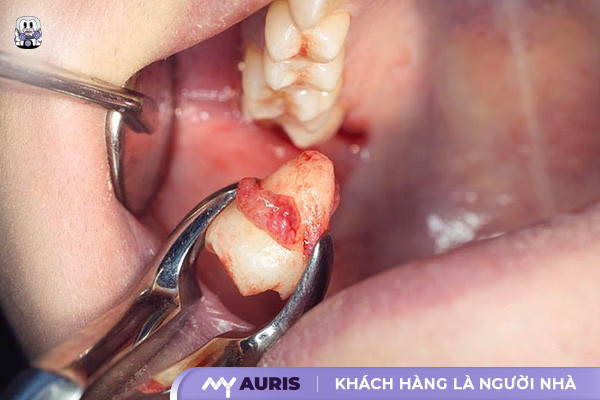
Is it okay to pull out a forbidden tooth without replanting it?
Extracting a forbidden tooth without replanting it is a common mistake but has many potentially serious consequences. After tooth loss, the gap area that is not restored will cause the adjacent teeth to tilt reclining, shifting, leading to misaligned bite and loss of facial aesthetics. In addition, reduced chewing ability affects digestion, causing jaw bone loss in the long term, causing sunken cheeks, wrinkled skin, sagging skin, and premature aging of the face. In addition, gaps in tooth loss create conditions for bacteria to enter, easily causing dangerous dental diseases.
How long does it take after a tooth extraction to get a porcelain tooth implant?
After tooth extraction, the body needs time for the jawbone and teeth to heal.Gums heal. According to the dentist’s recommendation, about 3 months after tooth extraction is the appropriate time to perform permanent porcelain dental implants using the porcelain bridge or dental implant method.
At this time, the gum tissue has stabilized, the jawbone is strong enough to support the implant or bridge, helping the denture restoration process to be safe, effective and reduce the risk of complications. Choosing the right time not only ensures aesthetics but also prolongs the life of restored porcelain teeth.
How long after tooth extraction can I get dentures?
After tooth extraction, the time it takes to plant a new tooth will depend on the level of healing, the location of the extracted tooth, the patient’s overall health and the tooth implant method chosen.
Normally, after 30–60 days, the patient can be temporarily restored with a porcelain bridge or removable denture. Meanwhile, to place a fixed dental implant, the patient should wait about 60–90 days, when the gum tissue and jawbone have completely recovered.
However, this time frame can vary depending on each clinical case. To accurately determine the time to replant a tooth, the patient needs to be examined by a dentist with high expertise in the field of dental restoration.
Does an extracted tooth need to be replanted?
Dental teeth play a key role in ensuring chewing function and maintaining overall oral health. When removing forbidden teeth, if not replanted in time, you can face jaw bone loss, tooth misalignment, increase the risk of dental diseases, seriously affect facial structure and reduce facial aesthetics.
Replanting forbidden teeth not only helps restore effective chewing function but also prevents many long-term complications. This is an important step to help you maintain healthy and balanced teeth, while preserving your natural appearance over time.
When do you need to have permanent teeth extracted?
Permanent tooth extraction is a minor dental surgery that is only indicated in cases where the tooth cannot be preserved. If the tooth decay is so severe that fillings are no longer effective, or the tooth structure is damaged, the pulp dies and leads to root canal inflammation but the pulp cannot be cured, then it must be extracted. In addition, severely loose teeth that make chewing difficult, or broken teeth with only the root remaining, also need to be extracted to avoid complications.
Common causes of this condition include: poor dental care, dental disease, advanced age that weakens the teeth, or accidents that cause serious damage. These factors make teeth susceptible to premature loss if not promptly intervened.





